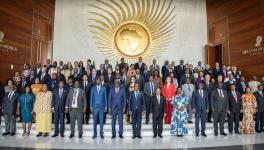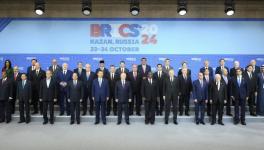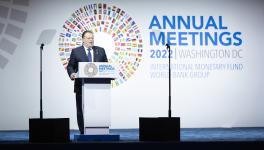Third Fuel Price Hike in Egypt at Behest of IMF

Traffic in Cairo in 2020. Photo: Wikimedia Commons
The IMF has brought about fuel price hikes for the third time this year in Egypt, deepening the cost of living crisis and eating further into household incomes at a time of growing poverty, into which increasing sections of the middle class have fast been sinking.
On the heels of previous hikes in March and again in July, the Egyptian government imposed another 11 to 13% rise on the gasoline price, depending on the grades. The 17.3% hike on diesel, which is the primary fuel used for the transportation of passengers and goods, will impose further upward pressure on the price of basic commodities.
These hikes, which will continue until the complete elimination of fuel subsidies by the end of 2025, are a part of the broader structural reforms that the government is undertaking in phases to secure the release of each installment of the USD 8 billion loan from the IMF.
The original loan amount approved by the IMF in December 2022 was USD 3 billion. It was augmented to USD 8 billion on March 6, 2024, soon after the government relinquished controls over the exchange rate, conceding to a long-standing demand of the IMF, bringing the Egyptian pound crashing down by 55% to a record low of 48 per US dollar.
“It has been catastrophic for tens of millions of consumers in a country heavily dependent on imports,” The New Arab reported.
Nevertheless, “sustaining the shift to a liberalized foreign exchange system… will be critical,” IMF’s Managing Director Kristalina Georgieva insisted, effectively warning the Egyptian government against reverting due to domestic pressure. She made these remarks at the conclusion of the IMF’s executive board meeting on March 29, where the augmentation of the loan by USD 5 billion was approved.
Egypt was allowed to draw USD 820 million of the promised USD 8 billion following the review that was conducted at this meeting, only a week after Egypt reduced fuel subsidies, increasing the price of gasoline by 8% and diesel by 18%.
A 33% hike was also imposed on butane gas cylinders, on which millions, especially from the poorer households, depend for cooking in Egypt where almost half the population has no access to natural gas supply. Georgieva deemed the elimination of subsidies as “essential”.
Along with privatization of the public sector and withdrawal of the state from funding large infrastructure, the phased elimination of subsidies of basic commodities is a condition imposed on the loan. To appease the IMF, the government slashed subsidies on bread on June 1, increasing its price by 400%.
However, the IMF was not satisfied. Already facing public outrage over increasing electricity blackouts, the government was dragging its feet on its commitment to further hike the fuel prices. So the IMF withheld the next tranche of USD 820 billion by delaying the next review until the government announced another hike of 10-15% on fuel by July 25, following an announcement by Prime Minister Mostafa that the fuel subsidies will be completely phased out by December 2025.
Four days later, on July 29, the IMF’s Executive Board completed the review, enabling Egypt to draw another USD 820 million. While the measures imposed by its loan conditions continued to drain the purses of the Egyptian people, the IMF expressed satisfaction that inflation had reduced and “fiscal targets were met.”
Deputy Managing Director Antoinette Sayeh went on to reassure that there were “signs of recovery in sentiment”, speculating that “private sector growth should be poised for a rebound.” But, she reiterated that “Restoring energy prices to their cost recovery levels, including retail fuel prices by December 2025, is essential.”
In order to ensure that the government stays on track to this deadline, despite warnings of domestic unrest, the IMF once again arm-twisted the government by withholding the release of the next installment worth USD 1.3 billion. The review required for the release of this amount, originally scheduled for September, was twice postponed. With the government imposing another round of hikes last week, the IMF can be expected to complete the review and release the next tranche of the loan soon. Some reports suggest this could be as early as November.
Get the latest reports & analysis with people's perspective on Protests, movements & deep analytical videos, discussions of the current affairs in your Telegram app. Subscribe to NewsClick's Telegram channel & get Real-Time updates on stories, as they get published on our website.
























